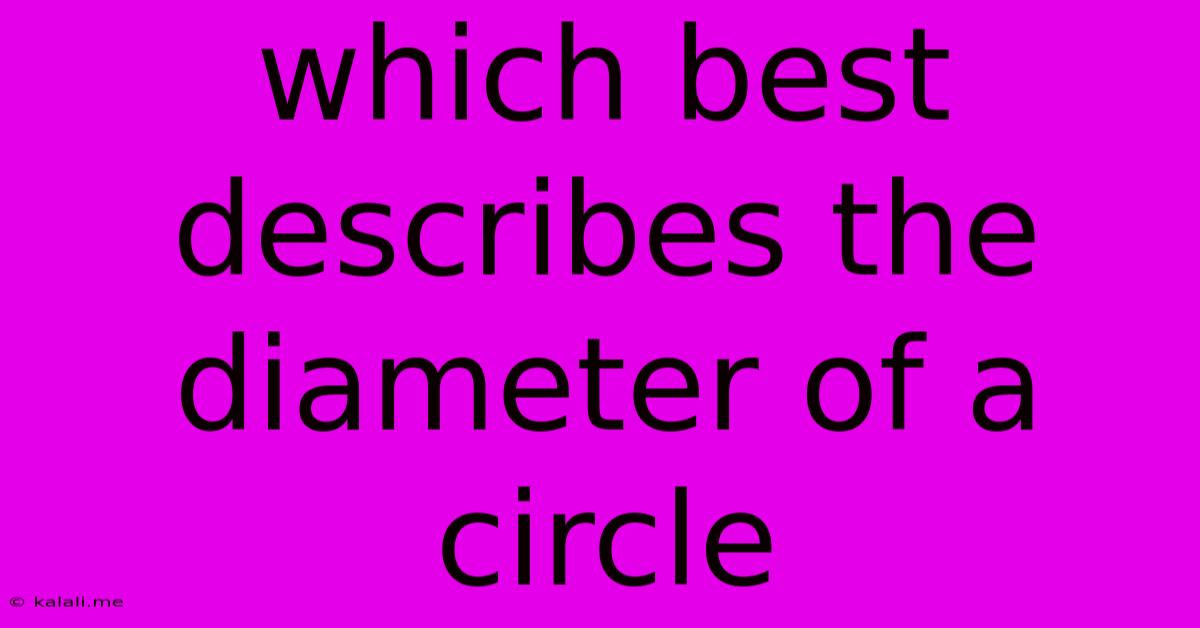Which Best Describes The Diameter Of A Circle
Kalali
May 09, 2025 · 2 min read

Table of Contents
Which Best Describes the Diameter of a Circle? A Comprehensive Guide
The diameter of a circle is a fundamental concept in geometry, often causing confusion for beginners. This article will clearly define what the diameter is, differentiate it from similar concepts like radius and circumference, and explore its significance in various applications. Understanding the diameter is crucial for anyone studying geometry, or working with circular objects in any field.
The diameter of a circle is the longest chord that can be drawn within the circle. It's a straight line segment that passes through the center of the circle and connects two points on the circle's circumference. This simple definition underpins numerous calculations and geometrical principles.
Understanding Key Terms: Diameter vs. Radius vs. Circumference
To fully grasp the concept of the diameter, it's vital to understand its relationship with other key aspects of a circle:
-
Radius: The radius is the distance from the center of the circle to any point on its circumference. It's exactly half the length of the diameter. We can express this relationship mathematically as: Diameter = 2 * Radius.
-
Circumference: The circumference refers to the distance around the circle. It's calculated using the formula: Circumference = π * Diameter (where π, or pi, is approximately 3.14159). The circumference is directly proportional to the diameter; a larger diameter results in a larger circumference.
Calculating the Diameter
Calculating the diameter is straightforward if you know either the radius or the circumference:
-
Given the radius: Simply multiply the radius by two: Diameter = 2 * Radius.
-
Given the circumference: Divide the circumference by π: Diameter = Circumference / π.
These simple calculations are essential in numerous applications, from engineering and architecture to everyday tasks.
Applications of Diameter in Real-World Scenarios
The diameter plays a crucial role in various real-world applications:
-
Engineering and Construction: Determining the diameter of pipes, wheels, or circular structures is critical for design, manufacturing, and material selection.
-
Manufacturing: In manufacturing processes, the precise diameter of components is essential for proper function and assembly.
-
Astronomy: The diameter of celestial bodies, like planets and stars, is a key parameter in astrophysics.
-
Everyday Life: Understanding the diameter is helpful in scenarios as simple as choosing the correct size of a pizza or a circular table.
Common Mistakes to Avoid
A common misconception is confusing the diameter with the radius or the circumference. Remember: the diameter is the distance across the entire circle through the center, while the radius is only half that distance. The circumference is the distance around the circle.
In conclusion, the diameter of a circle is a fundamental concept with far-reaching implications across various disciplines. By understanding its definition and relationship to other key terms, one can accurately calculate and apply this essential geometrical concept in numerous real-world situations. Mastering this fundamental concept provides a solid base for more advanced geometrical studies.
Latest Posts
Latest Posts
-
19 8 As A Mixed Number
May 10, 2025
-
What Is 160 Minutes In Hours
May 10, 2025
-
How Many Cups Of Water Are In 16 9 Oz
May 10, 2025
-
What Is 42 Fahrenheit To Celsius
May 10, 2025
-
Why Does Secondary Succession Occur Faster Than Primary Succession
May 10, 2025
Related Post
Thank you for visiting our website which covers about Which Best Describes The Diameter Of A Circle . We hope the information provided has been useful to you. Feel free to contact us if you have any questions or need further assistance. See you next time and don't miss to bookmark.